From bad ideas to bad hygiene to flat-out bad manners, these mistakes make you a not-so-great guest. Here's what not to do in a hotel room—and what to do instead.

18 Things You Probably Shouldn’t Be Doing in a Hotel Room


Stealing the bathrobes
When thinking about what not to do in a hotel room, consider stealing top of the list. Wearing a bathrobe around the hotel—other than to the pool or spa—is definitely a rude hotel habit, but that’s nothing compared with taking it with you to wear at home. And there’s no point trying to sneak out with an extra bathrobe in your suitcase (or a pillow or towel), no matter how soft and fluffy it might be. Apart from being straight-up theft, taking a hotel bathrobe home can land you with an unwanted charge on your account.
“Often, high-end hotels will offer their bathrobes for sale, and they can easily cost more than $100,” says travel writer and hotel reviewer Laura Itzkowitz. “If one of them ‘accidentally’ makes its way home with you, I’d say there’s a 99% chance a charge will show up on your credit card, even if it takes a while for them to notice the missing robe.” The same goes for towels, artwork, electronics and other items meant to stay in the room after you leave. If you’re unsure whether you’re allowed to take a given item, leave it in the hotel.
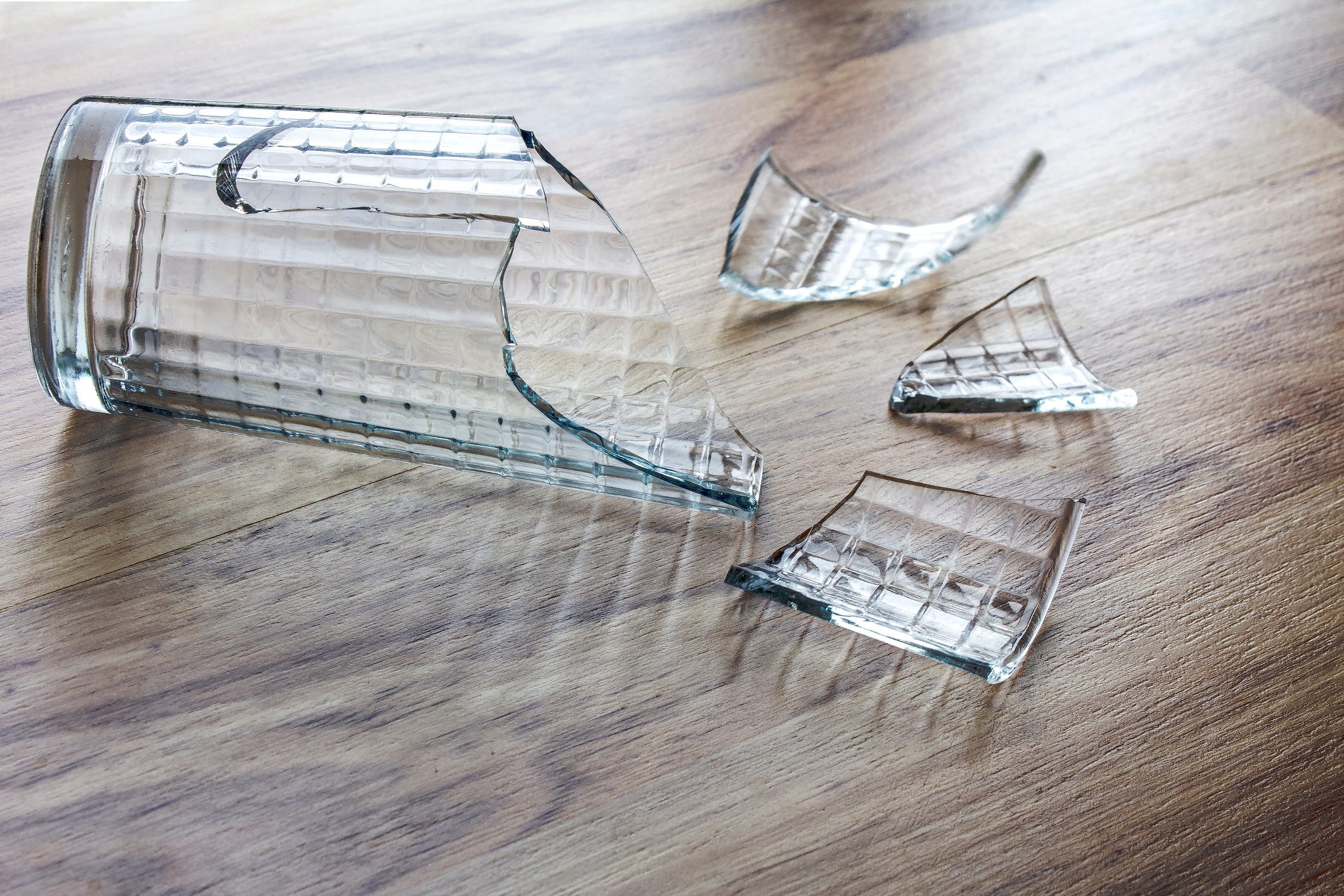
Breaking something and lying about it
Accidents happen, but damaging something in your room and keeping it a secret isn’t just an etiquette mistake. It’s a potential hazard for staff or future guests. So if you break a glass, for example, pick up the visible pieces and tell the housekeeping staff about it so they can do a thorough check for any glass you might have missed. Should something pricier break, like a TV or tablet, report it to the front desk, even if that means you may be charged for the item—if you’re honest, they’re more likely to be understanding. I’ve actually lived this one: Our then-toddler daughter dropped an in-room iPad and broke it. The hotel was kind enough not to charge us.
This is also a good reason to do a thorough room inspection when you check in. Notice something is broken before you even unpack your suitcase? Immediately report it so the staff will know it was like that when you arrived. Of course, if a lot of things are broken or malfunctioning in your room, that’s a red flag of a bad hotel, so you might want to rethink your accommodations.
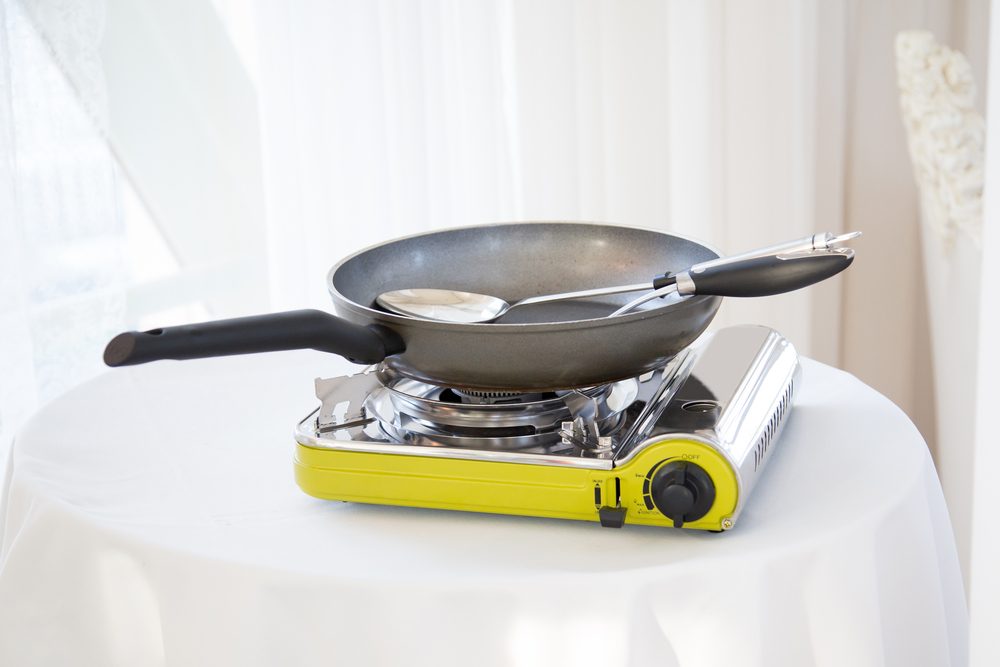
Cooking without a proper kitchen area
“Don’t follow those crazy Instagram or TikTok stories that suggest you use the kettle to cook ramen or the iron to toast a sandwich!” says luxury travel consultant Rebecca Winke, who also writes hotel reviews for the Telegraph. “You’ll ruin the hotel’s appliances, you’ll get charged—and you’ll also create a major fire hazard.”
We get that you might be traveling on a budget, but unless your room has a kitchen or kitchenette, it’s better to make a cold sandwich or grab some takeout ramen—already cooked! And forget about bringing your own cooking appliances with you. Hot pots and other cooking gadgets are not conducive to a safe and enjoyable hotel stay, for you or the other guests. Cooking appliances can stink up the room, set off the hotel’s fire alarm system or cause an actual fire.
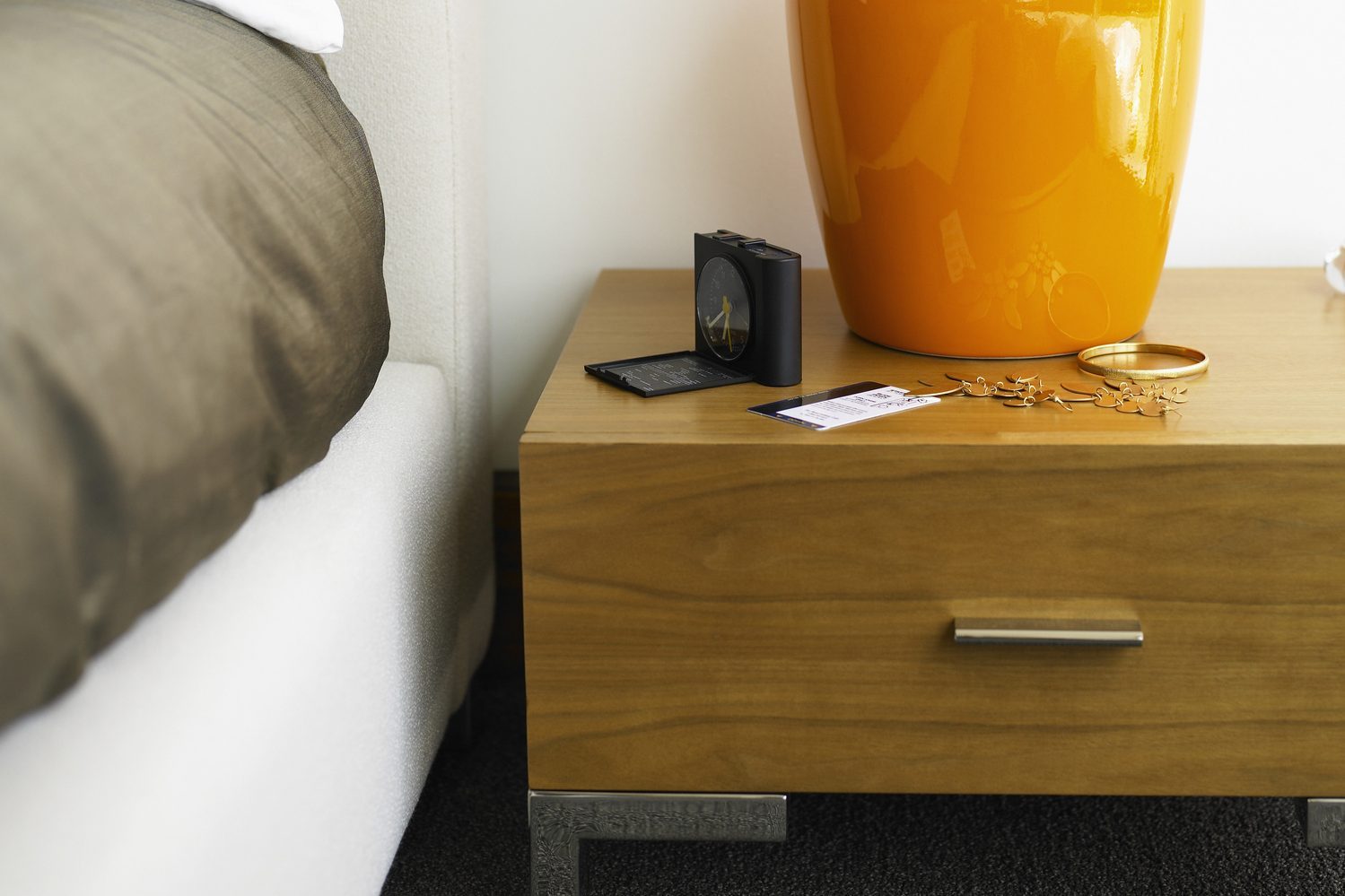
Leaving jewelry or valuables in your suitcase or dresser
Most hotels and hotel rooms are totally safe, and most hotel management is deeply invested in keeping them that way. It’s rare for hotel staff to steal from a guest’s room—and rarer still for someone to enter another person’s hotel room undetected. But it does happen. Don’t tempt fate by leaving valuables such as jewelry, cash or laptops in your suitcase or dresser. Instead, use the in-room safe.
In the unfortunate event that you do experience a theft, report it to both hotel management and your homeowners insurance company, which may provide coverage for your belongings while you are traveling. But keep in mind your results may vary. According to Utah-based attorneys Ascent Law, hotel liability laws vary from state to state. And when you’re outside the U.S. (as my friend found out when she had her laptop stolen from her room at a five-star property in Italy), the hotel may deny any liability whatsoever.
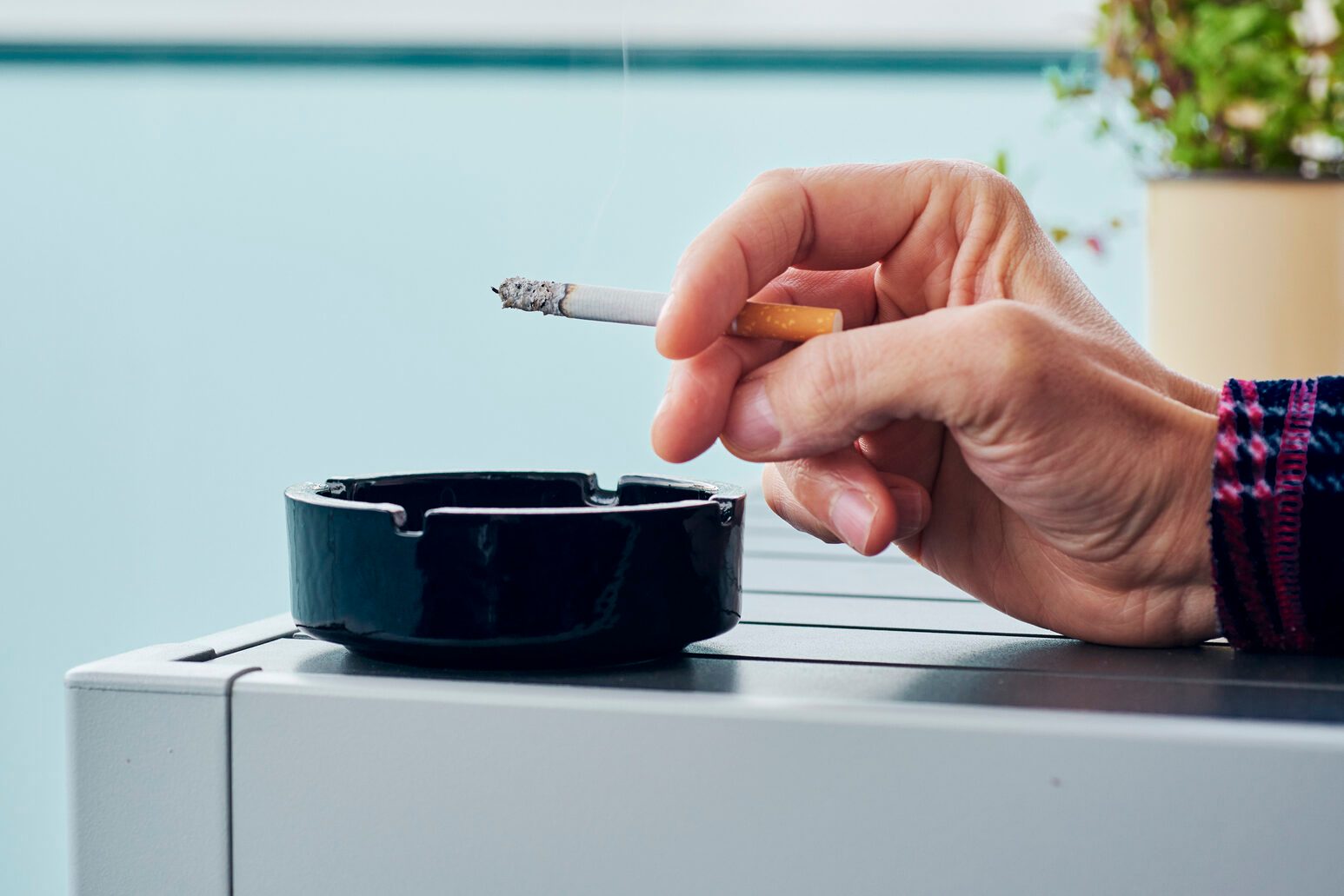
Smoking anywhere (or anything) in a nonsmoking room
This may seem obvious when considering what not to do in a hotel room, but nonsmoking rooms are not for smoking—period. My friend once found this out the hard way when she smoked a cigarette on the balcony of a nonsmoking room, thinking it was allowed. Instead, she received a $250 fine added to her bill upon checkout. Trying to get around the rules by airing out the room or, worse, covering up the smoke alarm never works. And in the case of tampering with the smoke alarm, it’s downright dangerous.
If you can’t book a room in which smoking is permitted, follow the hotel rules and smoke outside in the designated areas. The same goes for vaping and smoking e-cigarettes, which can also set off smoke alarms. And as far as weed goes? Legal or not, smoking it in any form in a nonsmoking room is a big no-no.
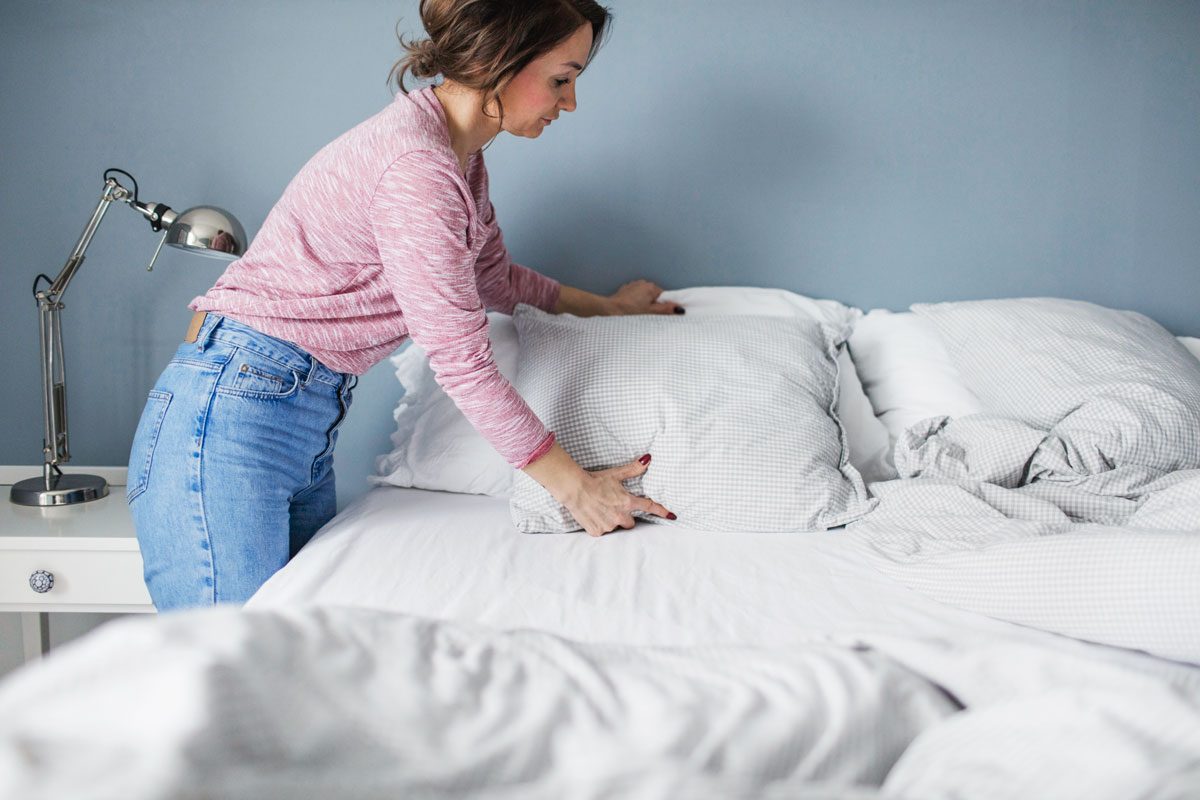
Forgetting to inspect the bed
Putting your luggage in the bathtub or shower when you first enter your hotel room may sound like a quirky hack, but we’re standing by it. Even the finest hotels and hardest-working housekeepers can’t always keep bedbugs at bay.
“I always advise travelers to put their luggage in the bathtub until they inspect the bed for bedbugs,” says Mitch Krayton of Krayton Travel, a custom travel agency based in Aurora, Colorado. Pull back the bedding and inspect the corners and edges of the mattress. If you find any creepy-crawlies, take photos of them and report your findings to management right away. If you can’t switch hotels, at least insist on being moved to a different room—which you’ll also need to inspect with an eagle eye.

Using the throw pillows
Those throw pillows may look cozy, but think twice before you rest your head—or any other body part—on them. “Decorative pillows look nice in a room, but the first thing I do is put them in the closet since I have no idea how many heads have laid on those pillows,” says Itzkowitz.
While sheets and duvet covers are changed with each new guest, throw pillows and other textiles remain some of the dirtiest spots in hotel rooms. “I feel the same way about fabric-covered headboards—attractive, but hard to clean,” she says, “and who knows how many heads have rested against them.” When you put it that way … yuck.
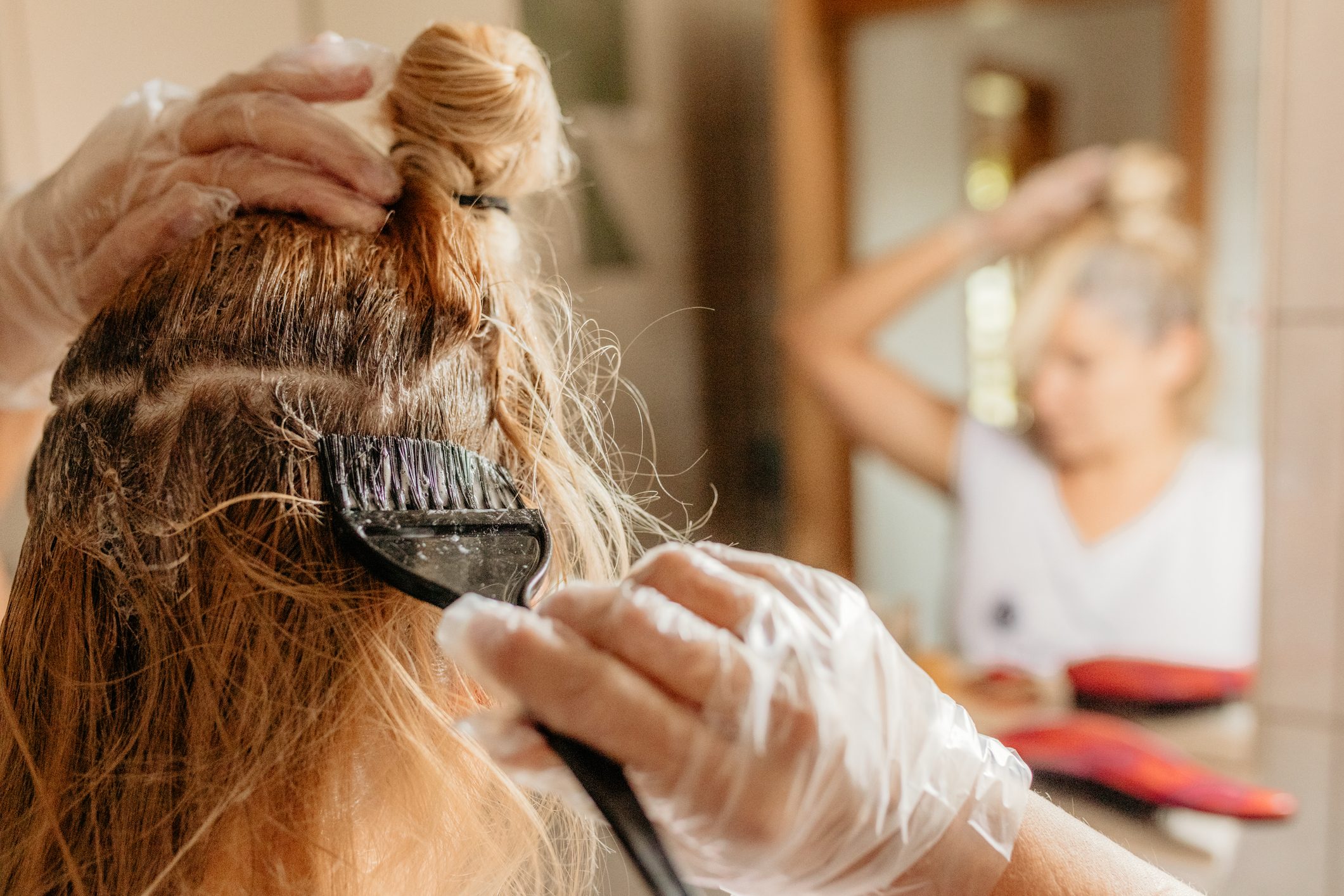
Dyeing your hair
No matter how badly you need a retouch for that special event, dyeing your hair in a hotel room is a recipe for disaster. It’s almost impossible to avoid staining a towel or bathrobe, and that hair color won’t wash out. Worse, you may receive an extra fee. “I’d be similarly cautious with doing DIY acrylic or gel manicures in a hotel room,” says Winke. “Apart from the fact that the odors might reach other guest rooms, you can easily mess up a towel or bedspread.” A better idea? Treat yourself, and ask the hotel to book you an appointment at a local salon.

Cheating the minibar
Minibars are one of those amenities increasingly vanishing from hotel rooms. But if yours still stocks the pricey little bottles of booze and $12 tins of cashews, know this: The house always wins. If you try to cheat the minibar—say, by filling an empty vodka bottle with water (yes, people have done that!)—eventually, you’ll get caught and charged.
The same applies to last-minute minibar raids. If you take an item (like a can of soda) out of the fridge the night before or the morning of checkout, housekeeping will eventually notice the missing item, and it will get added to your final bill. Be careful, too, about nonrefrigerated items like salty snacks or chocolates. Unless otherwise specified, they’re almost never free. “I almost never use hotel minibars because they’re so overpriced,” says Pauline Frommer, noted guidebook author, on-air expert and president of Frommer Media. “But if I do take something near the end of my stay, I make sure to tell the front desk so they can add it to my bill.”

Sending sensitive information over hotel Wi-Fi
I recently shared a hotel room with a friend and started to log in to my online banking account using the hotel’s free Wi-Fi. She practically screeched in horror—and she was right: Sending sensitive info via the hotel Wi-Fi was a rookie mistake. “No one should ever, ever send any sensitive information or conduct any important business over hotel Wi-Fi—at least not without encryption,” says Harold Li, vice president of ExpressVPN, an online security company. “Given how easy it is to hack public Wi-Fi hot spots, you might as well be yelling your passwords and bank details down the hall.”
Smart travelers use encryption to shield their internet activity when sending important information. So before your next hotel stay, learn how a VPN (virtual private network) can keep your information safe on public Wi-Fi.
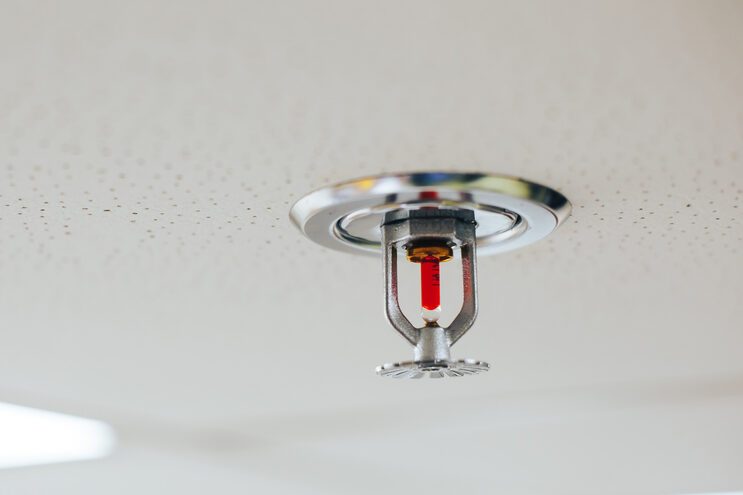
Using the sprinkler as a coat hanger
Closets are great for hanging clothes—the sprinklers on your hotel room’s ceiling are not. But believe it or not, this happens, especially in hostels and other places frequented by budget travelers, who may be hand-washing clothes and hanging them up to dry. It’s a silly stunt, and while it probably won’t trigger a hotel-wide flood (as accidental discharge of fire sprinklers is uncommon), it could damage the sprinkler apparatus—damage for which you’d be responsible.
To that point, if you do hand-wash any clothes, hang them up to dry in the shower or over the tub, not on other surfaces or objects in the room. Linda Martinez, co-owner of the Beehive Hostel in Rome, says they have a rule against hanging wet clothes in the room. “People hang them on the beds or on the radiators or out the windows,” she says. “It looks bad when clothes are hanging from a window, and wet clothes can also damage furniture and rust the radiators.”
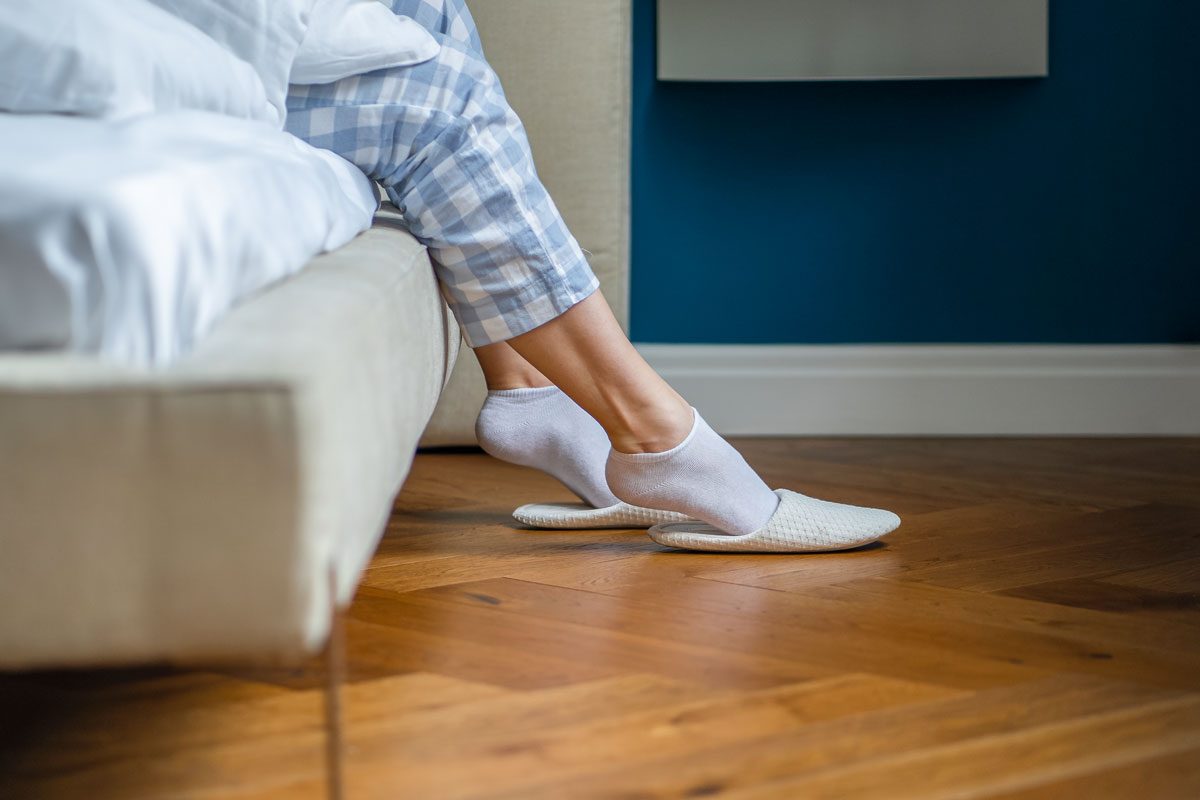
Stomping around
Staying in a hotel is a lot like living in an apartment. You have neighbors all around you, and the walls and floors may be thin. Loud music and voices aren’t the only things you should keep in check when you’re in a hotel room. “In older, historically protected buildings, such as the centuries-old palace hotels in Rome, where I live, there’s only so much soundproofing that can be done, especially between floors,” says Itzkowitz. “If the hotel has uncarpeted floors, I take off any hard-soled or high-heeled shoes before I walk around. Or better yet, if the hotel provides slippers, I use those.” (Bonus: When offered, disposable slippers are among the free things you can take from a hotel room when you check out.)

Sneaking in your pets
As a lifelong dog person, I’ve gotten more than my fair share of “puppy dog eyes” when I pull out my suitcase for another trip—one of my dogs even tries to curl up inside while I’m packing. But unless I’m checking into a pet-friendly hotel, my beloved dogs have to sit and stay … at home.
There’s no point in trying to get around the rules or pulling a fast one on staff. Firstly, your dog could give the game away by barking, and even cats can meow quite loudly. Animals also leave trails of evidence, from hairs to paw prints to smells, and your cleaning fees will skyrocket if you’ve broken the rules. Besides, it’s disrespectful to the housekeeping staff, who are already working hard to keep the rooms safe and sanitary.
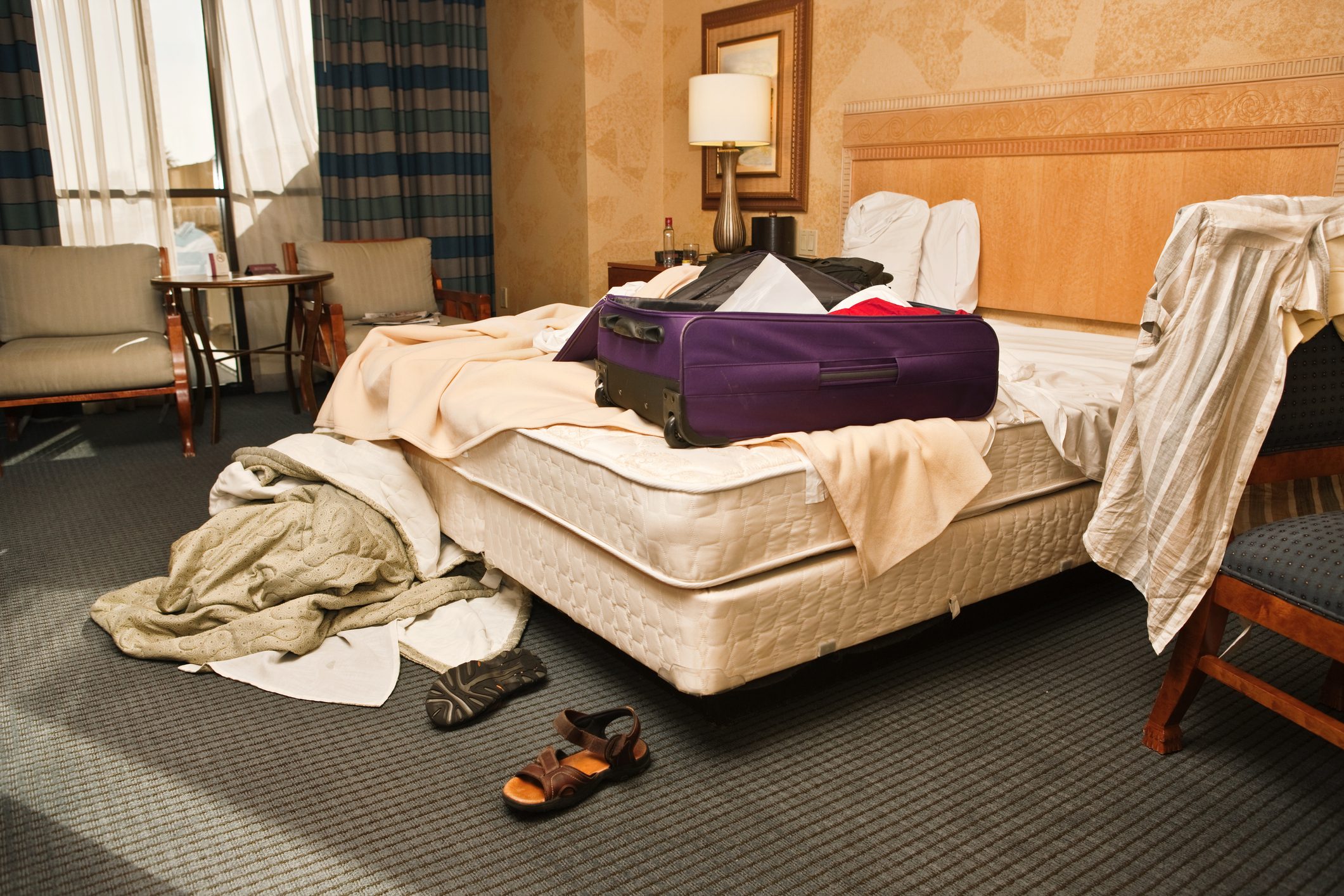
Making a huge mess
Having someone else do chores like making the bed and tidying the room is a luxury of a hotel stay. But don’t wear out your welcome by making a huge mess in the room. “Try to be considerate of the housekeeping staff,” says Itzkowitz. “They’re the most invisible staff members, they earn the least and they sometimes have a limited amount of time to clean a large number of rooms.”
If you’ve ordered room service or done some partying in the room, at least make an orderly gathering of your dinnerware and empties. And don’t leave dirty clothes strewn all over the place during your stay. It makes cleaning more difficult.

Waiting until you go to bed to try the pillows
Right after you’ve checked your bed for bedbugs and given the all-clear, test the pillows you’ll be sleeping on. Winke says it’s one of the first things to do in your hotel room. “If you are pillow picky,” she says, “check them immediately and have the front desk bring you more or alternatives during the day when the hotel is still fully staffed and can take care of requests like that quickly.” You may not have the energy to deal with it once you’re in sleepytime mode, plus smaller hotels may have a lone staffer working the night shift, which could make it harder for them to get to your request before you hit the sack.
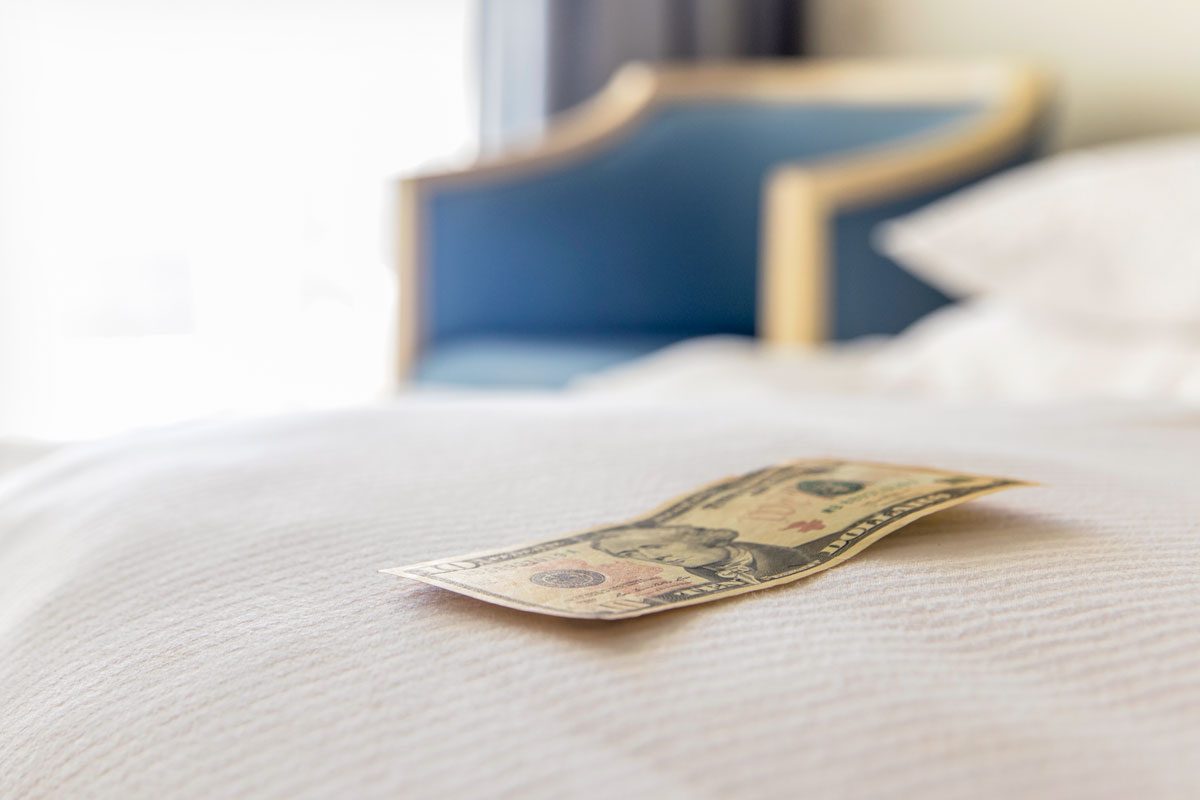
Forgetting a daily housekeeping tip
First things first: You should be leaving tips for hotel housekeeping. “Hotel housekeepers work very hard, and they accept lousy pay because it is the norm today for them to be tipped,” says Frommer. “When you don’t tip them, you are breaking an unspoken social contract—and acting unkindly.”
She adds that it’s best to tip daily, rather than at the end of your stay, to make sure the person actually doing the work gets the money. Housekeepers work in shifts, and whoever cleaned your room on Tuesday might not be the same person cleaning it on Wednesday. The fairest approach is to leave a daily tip of at least $3 to $5. That day’s housekeeper can pocket the tip, and no one gets cheated.

Having a little too much “fun”
We get it. Hotel rooms are great environments for a little friskiness, especially if you’re on a romantic getaway. But walls and floors can be thin, so just like you shouldn’t stomp loudly on the floor, you shouldn’t do other things loudly in your hotel room either. Why risk the embarrassing side-eye at the breakfast buffet? It’s just good manners to tone down the volume during your romantic rendezvous.

Being rude to the staff
Travel is more stressful than ever—for guests and hospitality industry workers. Airlines, restaurants, hotels, all-inclusive resorts and retail outlets are experiencing staffing shortages, and travelers often bear the brunt of this understaffing. The person helping you may be a new trainee or may be overworked, or the hotel may be shorthanded. Whatever hiccups may occur in service or your special requests, they’re seldom the fault of a single person. Now’s the time to be a gentler traveler: Be a little more patient and a little less demanding, and you’ll also be more likely to have your request met.
Additional reporting by Noelia Trujillo.
About the experts
|
Why trust us
Reader’s Digest has published hundreds of travel stories that help readers explore the world safely, easily and affordably. We regularly cover topics such as the best places to visit (and the best times to visit them), tips and tricks to zoom through airport security, flight-attendant secrets, hotel-room hacks and more. We’re committed to producing high-quality content by writers with expertise and experience in their field in consultation with relevant, qualified experts. We rely on reputable primary sources, including government and professional organizations and academic institutions as well as our writers’ personal experiences where appropriate. We verify all facts and data, back them with credible sourcing and revisit them over time to ensure they remain accurate and up to date. Read more about our team, our contributors and our editorial policies.
Sources:
- Pauline Frommer, president of Frommer Media; interviewed, February 2025
- Linda Martinez, co-owner of The Beehive Hostel in Rome; interviewed, February 2025
- Laura Itzkowitz, travel writer and hotel expert; interviewed, May 2023
- Rebecca Winke, luxury travel consultant; interviewed, May 2023
- Mitch Krayton, Krayton Travel; interviewed, May 2023
- Harold Li, vice president of ExpressVPN; interviewed, May 2023




















